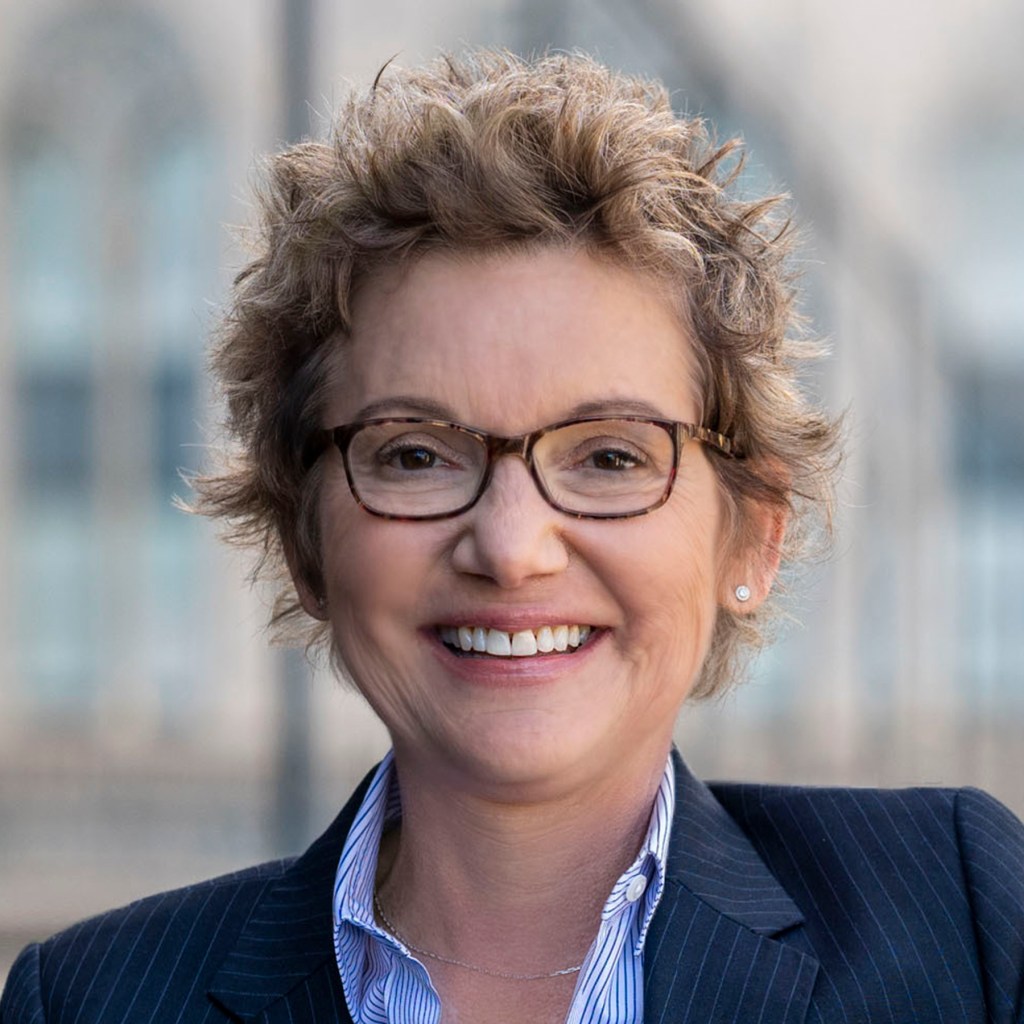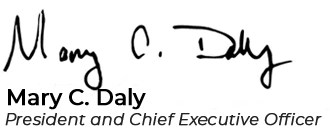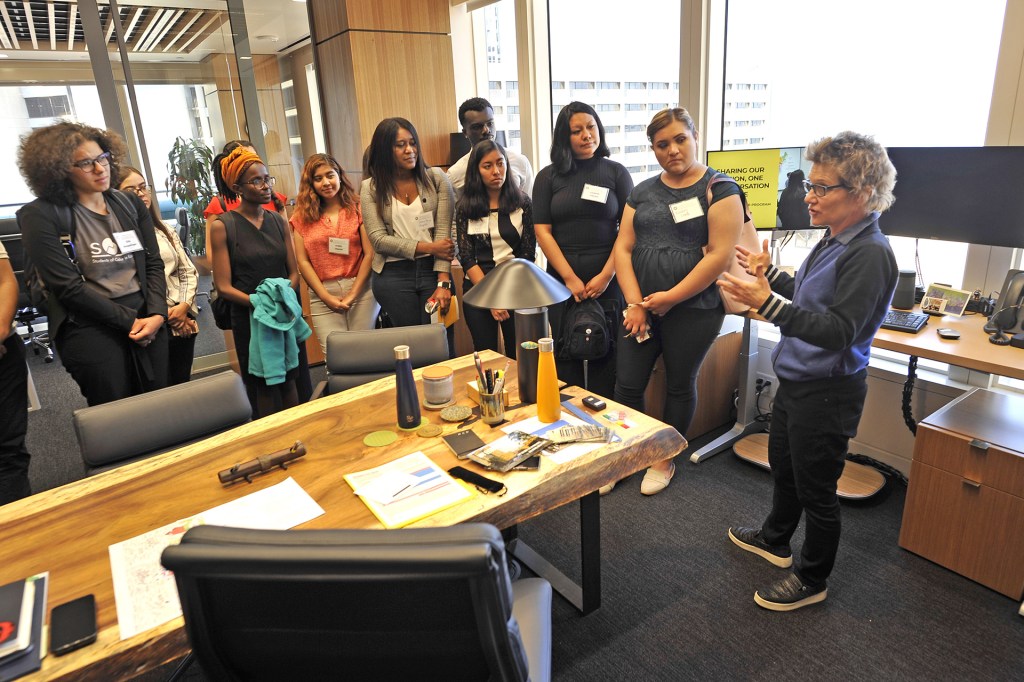Mary C. Daly, San Francisco Fed President, speaks with Berkeley students in economics.
Every once in a while, the Fed may invite you to answer a survey, join a roundtable, or be part of a focus group. Here’s why we’re knocking at your door—and why you should answer.
A few weeks back, I was shopping at a local retail outlet in Oakland, CA. In every aisle, I could see people taking the time to really look at prices and weigh their options. I started talking with one dad with his two children, who were looking at backpacks and shoes. He had a look on his face, and I knew from my own experience growing up that someone was going to have to put something back. He told me how both he and his partner are working but the majority of their paychecks is going to essentials such as housing, food, and utilities. With rising prices, what was left in the budget every month kept getting smaller and smaller.
It was the indignity of inflation at work.
I told the dad something I’ve been saying a lot these days: It is the number one priority of the Federal Reserve to bring down inflation. We know from the data that inflation is too high. But conversations like the one I had with this dad illustrates how people are experiencing inflation. It brings to life what research tells us about the unequal impact of inflation, which hits low- to moderate-income families harder, since these families spend a far larger fraction of their monthly budget on basic needs.

At the Fed, it’s our job to ensure that Americans everywhere have opportunities to earn a living and confidence that the money they earn will hold its value. To do this job well, we believe it’s important to hear the experiences of all communities, including those facing barriers to economic participation. These insights help us make better decisions and better policy to create an economy that works for all Americans.
Learning about how people are experiencing the economy in real time
We often talk about the Fed as being heavily data dependent. Over the course of my career as a macro-labor economist, I’ve analyzed quantitative data, identified trends with it, and pushed for greater access to it to make sense of what’s going on in the world around us. I also rely on data as a policymaker to make informed decisions about monetary policy.
But the thing about data is that it only tells part of the story. To better understand how people are experiencing the economy in their day-to-day lives, we need to look at both the numbers and listen to community members about how the data is translating into real impact, in real time. Data trends can also take time to develop, so real time conversations with people help us to see what may be coming around the corner. Both data and listening to the communities we serve are essential to having a more complete picture of economic conditions on the ground—and both are parts of our philosophy as a community-engaged organization.
Listening to and learning from the perspectives and experiences of communities who have faced barriers to economic opportunity and growth—often lower-income communities and communities of color—are important for us as we strive to meet our mission. The greater our understanding of how different people and businesses experience the economy, the better we can meet our congressionally-mandated monetary policy goals of stable prices and maximum employment.
Listening to our communities in different ways
The Federal Reserve System is uniquely designed to engage with communities as a way to better understand how the local economy is working for everyone. Each of the twelve Federal Reserve Banks develops close relationships with the regions and the people they serve, and listening activities are happening across the country.
We connect routinely with business, industry, and community leaders to understand local economic conditions and elicit input for the Beige Book report, a biquarterly summary of economic conditions in our Districts as reported by business and nonbusiness leaders across the regions. A number of Reserve Banks now include portions specific to challenges facing lower-income communities in the Beige Book. In San Francisco, we call this new section “Community Conditions.”
The Fed also listens to our communities through other facets of our work—whether it’s conducting economic and community development research, engaging with local board and advisory council members, or convening listening sessions to hear directly from the people in our Districts.
Recent listening sessions in Minneapolis on the impact of inflation told us, for instance, that some workers are leaving jobs that require driving their own cars because mileage reimbursements aren’t matching, and may fall far short of, what they pay out of pocket for gas. In similar sessions in San Francisco, we heard that many people are unable to find affordable places to live or face the risk of losing their homes, as rental and home prices increase, assistance programs expire, and prices for food and other necessities continue to rise.
We’re also changing how we’re listening through projects like the Worker Voices Project, an opportunity to hear firsthand from workers without four-year college degrees who are in, or have recently left, high-turnover jobs. Through this effort, we’re convening focus groups from workers across the country and sharing what we’re learning from these conversations about how our country should be thinking about the future of work.
We care about what’s happening in your community
What we do at the Federal Reserve—particularly through our Community Development work—touches all communities. We’re keen not only to listen, but to share our research, data, tools, and expertise that can help community development professionals in your work of supporting lower-income communities.
Fed Communities is a resource we established during the pandemic to make it easier for you to access these things from the Fed’s Community Development teams. Our work focuses on what’s happening in communities everywhere—including yours. And, our work depends on the insights we gather from you and others across the community.
Listening and learning from you gives us the ability to make decisions informed by how people are experiencing the economy in real time in regions and communities across the country. The next time we knock at your door asking you to take a survey or attend a focus group or listening session, please answer. You can help us make a difference.








